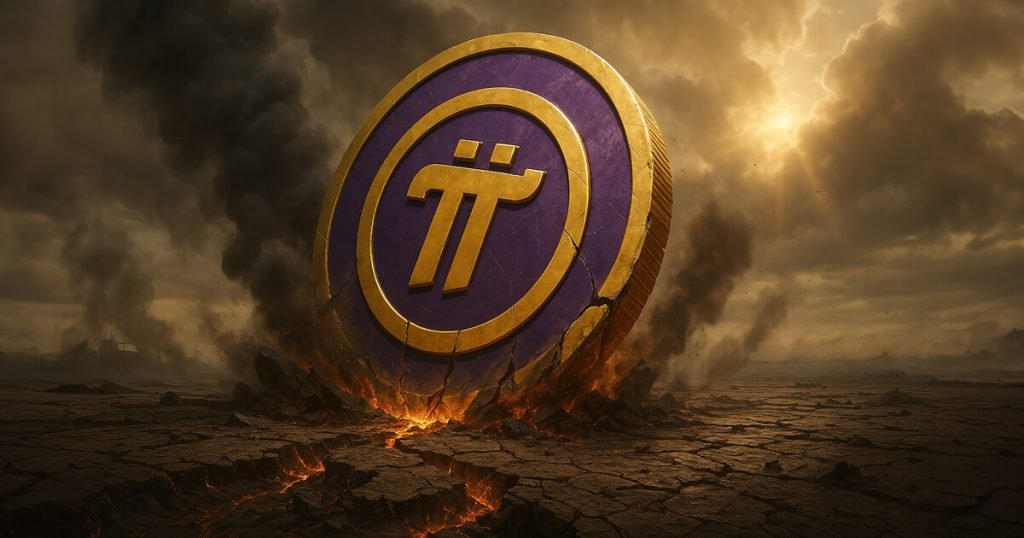Pi Network Faces Growing Frustration Amid Declining Token Value
The Pi Network community is currently experiencing significant unrest as the value of its token hits record lows. Longtime participants are expressing concerns regarding the project’s overall direction, particularly following a statement made by Pi Network Turkey, the largest community group in the region. On April 3, they publicly voiced frustrations about the project’s leadership and its seemingly aloof stance regarding user feedback. This discontent stems from a perceived shift in the governance model of Pi Network, which initially promised a decentralized approach but is now seen as adopting a more hierarchical structure.
The core of the issue lies in the growing disconnect between the developers and the community. Pi Network Turkey accused the team of sidelining user concerns, emphasizing that the original values of decentralization are being undermined. Their statement reads: “The things we once looked forward to with excitement have now become mere disappointments.” This sentiment reflects a deep sense of betrayal among users who invested not just their time and resources, but their hopes in the potential of the Pi Network. The group voiced questions about the ethical implications of neglecting the contributions and dreams of its dedicated user base.
Among the key grievances highlighted by Pi Network Turkey are the indefinite delays surrounding the launch of the open mainnet. This delay raises fundamental questions about the project’s transparency and its future. The community feels that the developers have not provided adequate information related to finances or partnerships, leading to a lack of confidence in the viability of the network’s decentralized application (DApp) ecosystem. There is a growing unease surrounding the number of operational DApps and their actual utility, leaving many users questioning the project’s long-term sustainability.
Adding to these discontentments is the absence of significant business integrations, which many believe is crucial for adding value to the Pi Network. This lack of integration has led to a growing distrust among users, especially as the developers have repeatedly failed to fulfill promises within a reasonable timeframe. In response to these ongoing frustrations, Pi Network Turkey announced an “unfollow protest,” encouraging pioneers to disengage from official channels and voice their dissent on various major platforms. They also suggested that if their concerns remain unaddressed, they may escalate their actions, including a coordinated campaign of one-star reviews on the app and a social media initiative branded #PiNetworkProtest.
Meanwhile, the timing of this protest coincides with a troubling trend as the Pi token experiences a drastic decline in value. According to market data from CryptoSlate, the token has dropped around 14% within a 24-hour period and is trading at approximately $0.50—its lowest since launch. Since reaching its peak of $0.50 on February 26, the token has lost over 80% of its value. Analysts attribute this decline to ongoing token unlocks, wherein nearly 120 million PI tokens—valued at an estimated $62 million—are entering circulation in April alone. With a total of 4.9 billion PI tokens released and another 1.54 billion expected over the coming year, the influx of tokens is exerting downward pressure on the token price.
When analyzing the broader implications of this downturn, some in the cryptocurrency community suggest that Pi Network is facing a damaged reputation. Given the ongoing skepticism about whether the project has truly capitalized on the Web3 hype, this criticism seems to resonate strongly among both users and external observers. The perception that Pi Network is struggling to deliver on its initial promises continues to undermine confidence in the platform, which was once hailed as a revolutionary venture in the world of cryptocurrency.
In summary, the tension rising within the Pi Network community reflects broader issues of governance, transparency, and trust. As participants voice their grievances and express feelings of betrayal, the token’s declining value serves as a harsh reminder of the stakes involved in such decentralized projects. The combination of frustrations over developmental delays and unmet promises has prompted users to take action, with protests illustrating the depth of the community’s concerns. As Pi Network navigates this tumultuous period, its ability to address user grievances and restore confidence in its vision will be essential not only for its growth but also for the future of the token itself.


